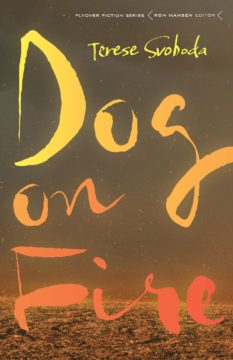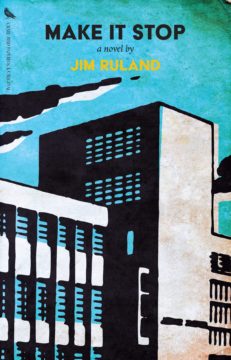Jim Ruland and Terese Svoboda in the Los Angeles Review of Books:
 TERESE SVOBODA: At first, Make It Stop reads like a fast-paced action adventure with a superhero, but the mission fails, people die. Imagine that in a Bond film! So, while the reader’s gliding along in the narrative, lots of plot builds up, people struggle with sadness and what it’s like to be a hero, particularly an unknown super-ish hero. I love the term “powerless to unfuck” that you use to underscore their struggle. More and more of these heroes in media are presented with complex personalities. Were you influenced by that trend?
TERESE SVOBODA: At first, Make It Stop reads like a fast-paced action adventure with a superhero, but the mission fails, people die. Imagine that in a Bond film! So, while the reader’s gliding along in the narrative, lots of plot builds up, people struggle with sadness and what it’s like to be a hero, particularly an unknown super-ish hero. I love the term “powerless to unfuck” that you use to underscore their struggle. More and more of these heroes in media are presented with complex personalities. Were you influenced by that trend?
 JIM RULAND: I don’t think so. You see a lot of that stuff in superhero movies, and before the pandemic I’d go see them with my daughter, but I read those comic books when I was her age in the ’80s. I knew from the very beginning that the vigilante group that my character Melanie was a part of would be highly dysfunctional, but I didn’t want it to be superficial. In blockbuster movies, there’s a scene or two where the main character is allowed to be sad and then it’s time to save the world again. Melanie’s world has been ripped apart—much like the narrator of Dog on Fire. What forces shaped your novel?
JIM RULAND: I don’t think so. You see a lot of that stuff in superhero movies, and before the pandemic I’d go see them with my daughter, but I read those comic books when I was her age in the ’80s. I knew from the very beginning that the vigilante group that my character Melanie was a part of would be highly dysfunctional, but I didn’t want it to be superficial. In blockbuster movies, there’s a scene or two where the main character is allowed to be sad and then it’s time to save the world again. Melanie’s world has been ripped apart—much like the narrator of Dog on Fire. What forces shaped your novel?
More here.
